- April 29, 2024
-
-
Loading

Loading
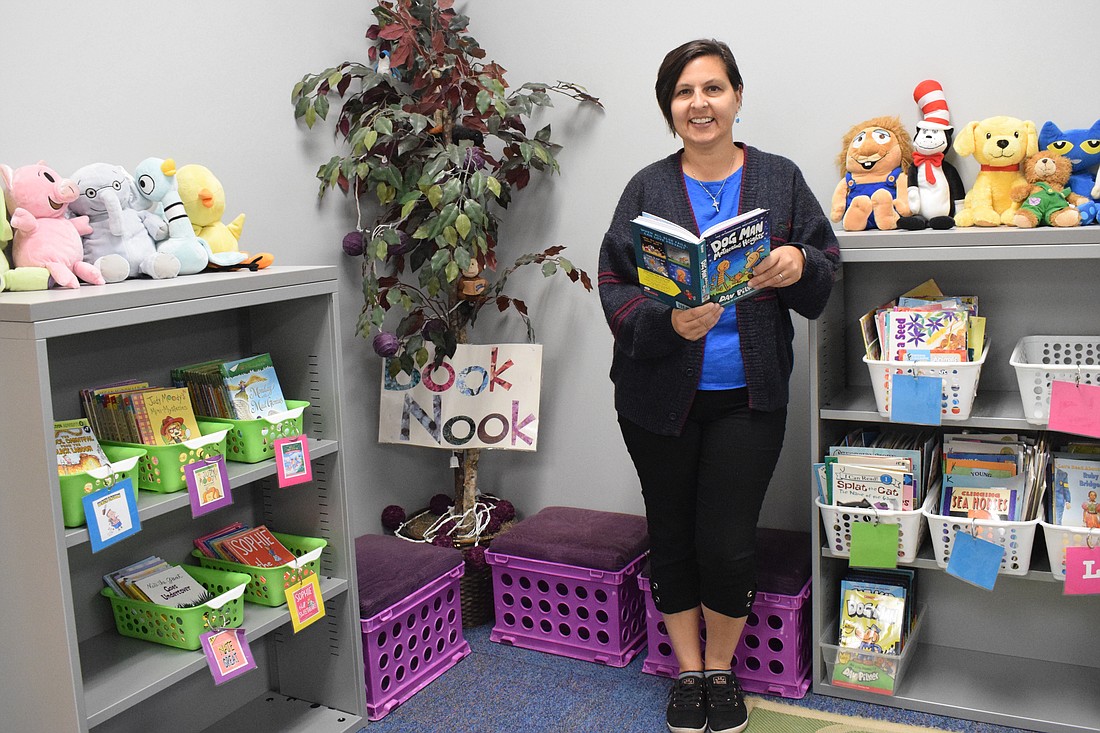
With the School District of Manatee County’s 1-mill property tax referendum on the ballot in November, the School Board of Manatee County members are reflecting on the district’s needs and how to best allocate funds from the referendum.
The referendum was first approved in 2018 and renewed in 2021. The millage has resulted in nearly $69.3 million budgeted for 2023-2024 and provides funding for salary supplements for employees, STEAM education, career and technical education, and charter schools.
The School Board of Manatee County will discuss the millage in the coming months, but in the meantime, the individual members are considering what potential changes they would like to see.
Although board member Cindy Spray said the district needs the millage to continue to support its teachers, she said the district should not be asking for a full mill due to the population growth in Manatee County and the income the millage has generated since its initial approval in 2018.
In 2018-2019, the district collected $37.3 million. The district has budgeted nearly $63.9 million for 2023-2024.
“I need to take a hard look at the millage, where the allocations are going and what the reward from the benefit of doing a whole mill has been,” Spray said. “There’s a whole lot of things we need to look at before I’ll ever, ever go beyond a .5 (mill). Taxpayers are suffering enough with inflation, insurance, groceries, gas, all of that. If we as a district can take some of that pressure off but still maintain the level of teachers, bus drivers and everything, I’m in support of it. I think we can achieve all those things.”
Spray said she supports the teachers but questions whether the millage has done its job in retaining qualified teachers.
“The turnover for the teachers I don’t think has lived up to the dollars we’ve collected. People are leaving for other reasons than pay,” she said.
Many residents who oppose the referendum vote against it because they don’t want to see teacher salaries attached to a referendum. They want teacher salaries to come out of the district’s general fund.
All five board members said the referendum is needed to continue to support teachers and remain competitive with other districts.
Board member Richard Tatem was an advocate for paying all salaries out of the general fund rather than depending on the referendum. Now a year after serving on the school board, Tatem said moving all salaries to the general fund remains a goal of his, but it’s not possible before the referendum is on the ballot in November.
Tatem said he spoke with Superintendent Jason Wysong and the district’s finance team on how funding for salaries can be moved from the referendum to the general fund, but the state is strict on how the district can budget its funding. Money cannot be shifted around like in a private company, he said.
“If the state gives us some relief on buckets of money and where we can spend money, we might be able to move some of that around,” he said. “Right now, it’s difficult to see how we’re not going to still have to use some millage.”
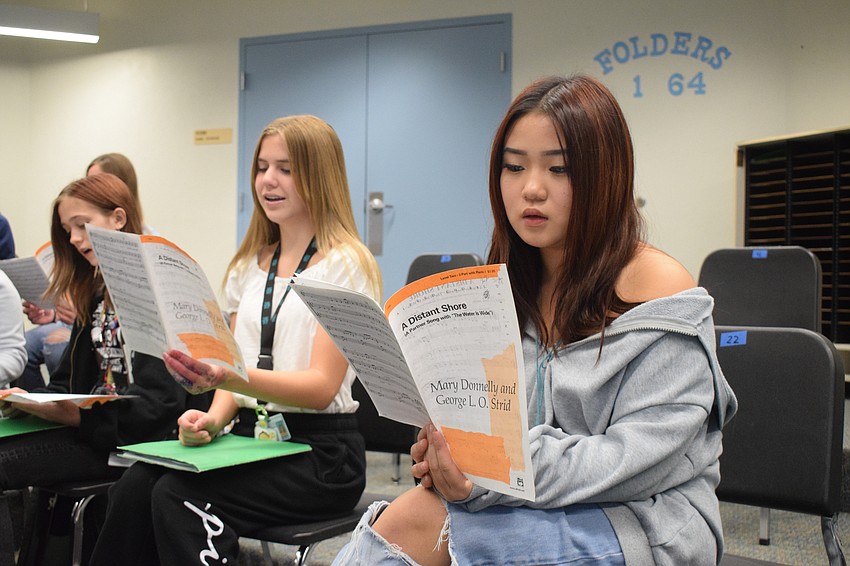
In 2023-2024, the district has allocated approximately $45.7 million to salaries, of which $35.3 million is for instructional staff.
“I’ve been to finance classes with the Florida School Board Association and look at all of this. I sat down and talked with very experienced finance people from all over the state and their answer is that the way that the laws and rules are set up, it’s very difficult to find enough flexibility to move a bunch of money around so all your employee costs can be paid out of the general fund,” he said.
Spray and board members Chad Choate and Mary Foreman said the state needs to do more to support education and provide funding.
“It’s a darn shame we have to go to the local taxpayers and say we need you to step up or the state doesn’t,” Foreman said. “That was a big eye opener for me when I first got on the board. We need the millage, there’s just no two ways about it. We can’t operate the schools without them.”
But board members are considering how the district can use the money more strategically.
The coming months will be a time for the district and the board to analyze students’ and teachers’ needs and how to best use the funding to address those needs.
Foreman said there are mental health as well as safety and security needs of the district that are being unmet.
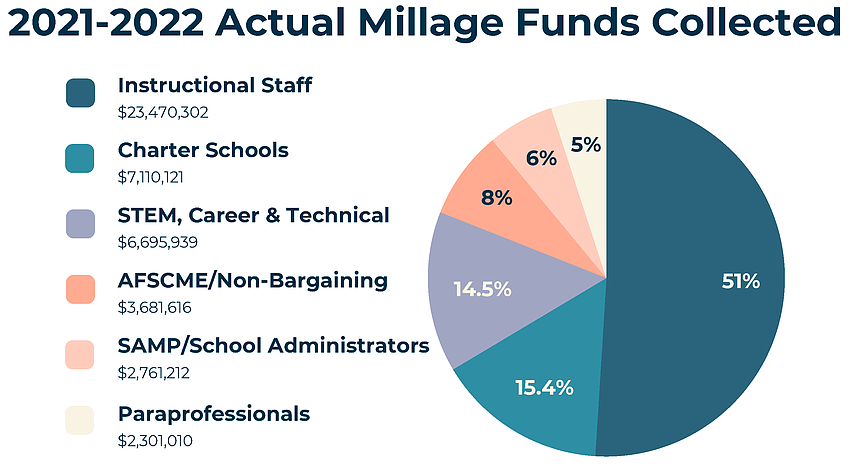
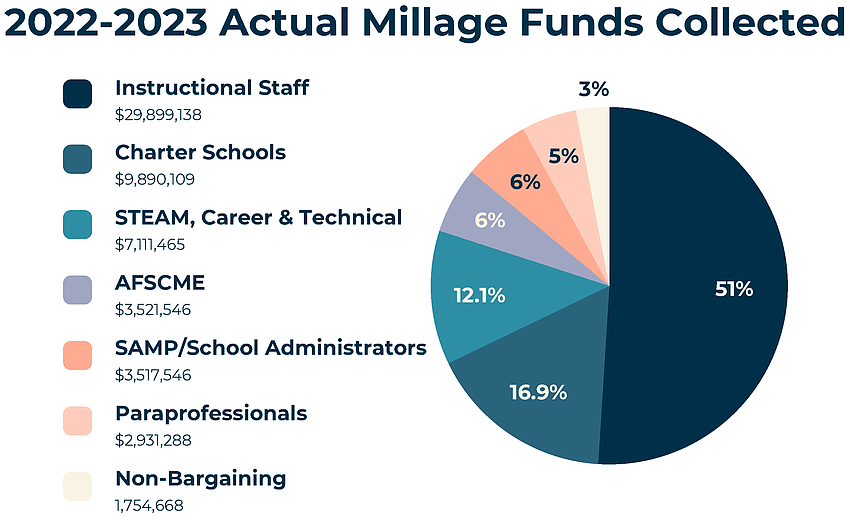
Foreman said it might be time to take a step back from providing as much funding to STEM and career and technical education as those areas have been receiving millions from the millage since 2018.
In 2023-2024, STEAM and career and technical education are budgeted to receive nearly $7.5 million, of which at least $2 million goes toward visual and performing arts. Arts was added to the referendum in 2021. Before then, STEM and career and technical education received nearly $6.9 million, which was 15.5% of the just more than $46 million collected in 2021-2022.
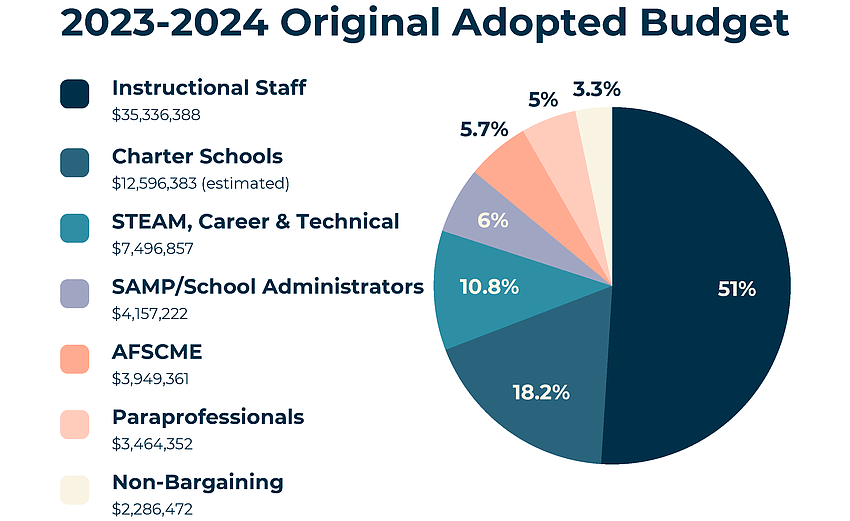
“We’ve invested very heavily in technology and STEM, and I see it paying off,” Foreman said. “We’ve invested money in some really fabulous programs and equipment. We definitely want to keep them going, but I don’t know if they require the same investment we’ve put into them in the past.”
Funding for visual and performing arts remains a priority for Foreman, Choate and Tatem. Foreman said the arts programs are in the process of making progress, especially after many programs took a hit during the COVID-19 pandemic in which some schools had to discontinue programs and there was decreased participation. She said in the first year of including arts in the millage, money was spent on materials, supplies and bringing in more arts teachers.
“The millage was for enhancements; it wasn’t to replace what we had before, so I think we’re making very good progress on that,” she said. “Our students and teachers are all benefitting from professional development and other outside (the district) activities, recitals, concerts and more. They’ve been doing some wonderful things, and I’d like to see that increase.”
Spray would like to see more funding go toward addressing elementary education, which is her priority. She said investing more in elementary education will lead to more success for students in high school.
Choate would like to see athletics added to the referendum. He said coaches are underpaid and the district relies heavily on support from boosters and other organizations to financially run athletics programs.
He said the referendum could help pay coaches more as well as allow schools to upgrade their facilities such as gyms, locker rooms and weight rooms.
Board member Gina Messenger said she plans to rely on the needs the superintendent assesses before making any determinations on how the millage would be altered.
“It should be based on the needs of the district based on the needs of our students so we can offer the best education because the community has shown they get behind the board and the one mill when it’s based on our needs for our students,” Messenger said.
If any changes to the millage are made, she said her priority is ensuring those changes are communicated well to the community.
Correction: This article has been updated to state Spray, Chad Choate and Mary Foreman said the state needs to do more for education.